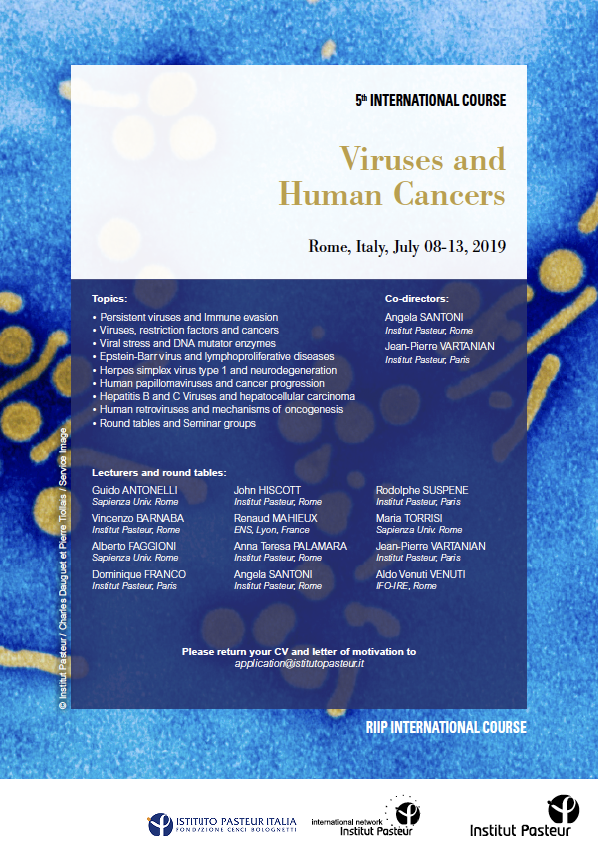Dates of the course: 08 July to 13 July 2019
Summary of the course
Considerable worldwide efforts are being done during the last two decades to improve ourunderstanding of the molecular biology of viruses and the mechanisms by which they cause disease, notably their link with carcinogenesis, which continue to be a leading cause of human death. In parallel, our molecular understanding of cancer biology has made substantial progress. During recent years, it became evident that inflammation is a major driving force in tumors development since chronic virus infection and carcinogenesis are closely correlated.
As obligatory intracellular parasites, viruses encode proteins that reprogram host cellular signaling pathways that control proliferation, differentiation, cell death, genomic integrity, and recognition by the immune system. Development of treatment and prevention strategies critically depends on the double understanding of the mechanism of cell tumorigenesis and the way they are influenced by viruses.
We will discuss during this course, how viruses can act at different stages in the complex multistep process of carcinogenesis. Early events include their involvement in mutagenic events associated with tumor initiation such as viral integration and insertional mutagenesis as well as viral promotion of DNA damage. Also involved in tumor progression is the dysregulation of cellular processes by viral proteins.
This course is located at the intersection between virology, immunology and cancer. The aimof the course is to educate graduates and post-graduates with understanding and expertise invirology, with a particular focus on viruses and human cancers. Mechanisms by which viruses escape from the immune system will be also discussed. This specific theoretical knowledge will provide students with the critical judgement and skills to pursue a career in virology, immunology and cancer. The focus of this course will be to strengthen the knowledge and competence of students in this field.
The program has a significant theoretical teaching component to ensure that the students gain maximal exposure to a wide range of clinically relevant viruses associated with human cancers. The frame-work of the course (7 days) will not allow the opportunity to organize practical work. However, to ensure interactivity, students in small groups will prepare a bibliographical analysis under the guidance of a tutor and will present their work to the whole class. It will be a great opportunity to allow students to discuss with experts, ask questions, and participate in a global exchange, paving the way for future collaborations.
Directors and contacts
- Pr. Angela Santoni
Institut Pasteur of Rome, Scientific director
Department of Molecular Medicine, Sapienza University, Rome
Tel : +39 06 44340632
Email : angela.santoni@uniroma1.it
- Dr. Jean-Pierre Vartanian
Department of Virology, Institut Pasteur, Paris
Tel : +33 1 44 38 94 45
Email : jean-pierre.vartanian@pasteur.fr
Chief administrative officer
- Maria Pia Lorenzoni
Istituto Pasteur Italia - Fondazione Cenci Bolognetti
Uffici Amministrativi e Laboratorio: Viale Regina Elena 291, 00161 Roma – Italia
Tel. + 39 06.49255627/8, Interno 36627/8
Fax + 39 06.49255629
Practical information
|
Location Institut Pasteur of Rome Viale Regina Elena 291, 00161 Roma, Italia Sapienza University Piazzale Aldo Moro, 5, 00185 Roma, Italie |
Language English Attendees 30 Duration 7 days Application deadline 15 May 2019 |
Documents available to download
Template, poster, program, application form
The call is open to scientific and medical students, Master, PhD, MD and Postdoctoral researchers.
The course will finance accommodation with breakfast, lunches and coffee breaks. The flight ticket and dinners will be at your own expense.
The committee of the course will evaluate applications



